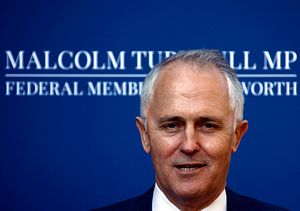Malcolm Turnbull has defeated Tony Abbott in a leadership spill and is now set to become Australia’s 29th prime minister. Julie Bishop remains deputy. Abbott becomes yet another one-term prime minister, but like Kevin Rudd and then Julia Gillard he was ousted by his own party, not voters. This is the third “coup” in five years.
For those less familiar with Australia’s political processes it’s important to understand it is the party which is voted into power, not its leader. The public never directly voted for Tony Abbott as prime minister but for the Liberal Party he was leading. That said, Australians often feel they’ve voted for the leader and by extension that the party has little right to arbitrarily decide otherwise. This was the case when Julia Gillard, then deputy leader of the Labor Party, ousted then Prime Minister Kevin Rudd; the public was largely horrified that such a thing could happen.
Later, Rudd turned around and – after two misfires – did the same thing to Gillard. Sick of the show, the public elected the current Coalition government. Indeed this Labor Party turmoil was one of the things that Abbott, an especially effective Opposition leader, campaigned relentlessly on, right into office. He continued to warn of it throughout his term and even into late Monday. Here is a statement not long before Turnbull’s 54-44 victory went public last night:
“I have been heartened by the messages of support flooding into Liberal MPs’ offices this evening saying most emphatically, ‘We are not the Labor Party’… This country needs strong and stable Government and that means avoiding, at all costs, Labor’s revolving-door Prime Ministership.”
In fact, leadership spills are more common for Opposition parties keenly tuned to opinion polls. Labor had a series of them during the Howard years; Kim Beazley, now the country’s ambassador to the United States, was brought back as leader what seemed like every second week (after Mark Latham’s memorable tenure and Simon Crean’s utterly forgettable one).
In 2009, while in Opposition, Abbott ousted Turnbull in a leadership spill which the former treated as a gentlemen’s disagreement: Malcolm Turnbull had been a good leader of the Liberal Party but they disagreed over the then-Emissions Trading Scheme and so, sadly, Turnbull had to go. In comparison, Turnbull has been harsh on Abbott this time. “Ultimately, the prime minister has not been capable of providing the economic leadership our nation needs. He has not been capable of providing the economic confidence that business needs… And we need a different style of leadership… We have lost 30 Newspolls in a row… There must be an end to policy on the run and captain’s calls.” This is a sentiment echoed across even the conservative press these days, although Abbott did have the support of Rupert Murdoch recently.
Though small-l liberals, and even some Labor voters, like the idea of Turnbull’s policies it does not appear, yet, that there will be any radical shift in policy. Rather, Australia is now supposed to receive a better explanation of policy and better, longer term strategy. Which would be good. Turnbull has been a vocal supporter of same-sex marriages, but as yet he has not suggested the government’s position will change. Indeed, he may go ahead with Abbott’s plan, which was for a plebiscite on the issue (a public vote that is not actually enforceable; it differs from a referendum in that it will not change the constitution). There may also be no change in climate policy ahead of COP21.
One reason for the policy caution is that Turnbull is regarded with suspicion by his party’s right wing. He is more a traditional Liberal (small and big ‘l’) than the conservative Abbott. Turnbull is very pro-business, although the flailing of his own broadband network plan is evidence that he’s hardly bullet proof. Still, Tony Abbott’s tenure as prime minister has been so disastrous that even former conservatives were willing to vote for a man more popular in the polls than both Abbott and Opposition leader Bill Shorten. Shorten now faces a far more formidable opponent when Australia goes to the polls.
The question now is this: Is this more evidence that Australian politics remains broken, factionalized and fractured? Whilst some conservatives have attacked the move, among them former Victorian Premier Jeff Kennett, via Twitter, the difference between Gillard’s move against Rudd might be that Rudd was still popular with the public, but hated by much of his own party. After a series of gaffes, Abbott was not popular anywhere. So perhaps the question should be this: Is the Australian public more tired of Australia’s factionalized politics than they were of Tony Abbott? Put another way, might a popular and later popularly elected Turnbull actually represent an end to the lengthy Killing Seasons?

































